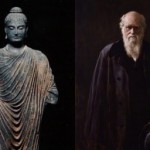
The Chinese word Tao and Western phrase the Laws of Nature refer to largely the same thing: that which is responsible for the regularity, complexity and organization we find in the universe. They do so, however, from nearly opposite perspectives. Tao emphasizes what we don’t know, the mystery of this phenomenon; science emphasizes what we do know and are able to use dependably. The Taoist approach is existential and holistic; the scientific approach is abstract and reductive. The Taoist approach is simultaneously cosmological and psychological and its meditative methodology seeks the unity of these two; the scientific approach demands the separation of the cosmological and psychological (the objective and subjective), at least in its basic methodology. It is the consequences of this third difference that I explore here.
The physicist Steven Weinberg stated that “The more the universe seems comprehensible, the more it also seems pointless.” (The notion that the mechanical universe of science provided neither meaning nor orientation for humans was prevalent long before Weinberg, however.) This raises a question: Is this alleged pointlessness actually true of the universe, or is it simply a consequence of the particular perspective from which science approaches the world?
We have noted that the perspective of science is connected to a methodology that systematically diminishes the subjective from consideration. If the subjective is eliminated at the base of the scientific enterprise, is it any surprise that it is absent from the world science discovers (and to a certain extent, invents)? And, is it any surprise that the world science presents to us is not one in which we, subjective beings that we are, find ourselves at home? These considerations at least suggest that the alleged pointlessness is not necessarily true of the world, but only of the scientific perspective on the world.
Taoism, for which the cosmological and psychological are always addressed together, presents a world in which we humans fit quite snugly. Nothing emphasizes this better than the great Taoist landscapes. In these works of art, the few humans we find fit proportionally and harmoniously with the land.
The ideal state of being for a Taoist is a state of deep, dynamic equilibrium and peace. The Tao Te Ching states: “And even though the next country is so close that people can hear its roosters crowing and its dogs barking, they are content to die of old age without ever having gone to see it.” The modern world, which produced science and in turn has been produced by science, is endlessly restless, chasing after crowing roosters and barking dogs all the way to the farthest galaxies. It is a world that has made the word “person” a synonym for “consumer,” and is driven by an economic system that seeks ever new ways to stimulate and exploit our desires.
The modern world bears scant resemblance to a Taoist landscape. Thus it is easy to simply dismiss Taoism as a quaint notion from an age long past. But the spirit of Taoism is flexible, it adapts. Who is to say it cannot absorb the entirety of the modern world and the scientific perspective into its dynamic equilibrium, its peaceful meditation? I have found it quite adequate in that regard. But here I want to suggest only a simple point: If you find the world pointless, then perhaps you should explore a different perspective from which to view the world. Taoism offers such a perspective.
Subscribe to The Spiritual Naturalist Society
Learn about Membership in the Spiritual Naturalist Society
__________
The Spiritual Naturalist Society works to spread awareness of spiritual naturalism as a way of life, develop its thought and practice, and help bring together like-minded practitioners in fellowship.
__________
Written by Thomas Schenk.













